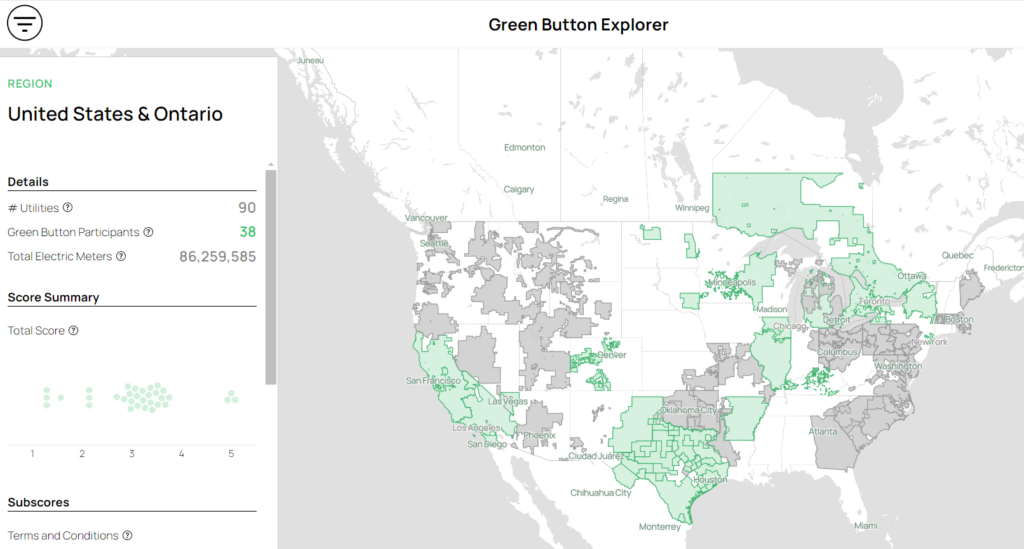Google-Funded Mission:Data Launches Interactive Map to Educate Policymakers on U.S. Energy Data Access

In the quest for a more sustainable and efficient energy future, data access is becoming as crucial as the energy itself. The Green Button Explorer, a tool developed by Mission:data in collaboration with key partners, aims to unlock this data, enabling both consumers and stakeholders to gain greater control over their energy usage. This powerful tool is poised to reshape the energy landscape by promoting transparency, enhancing grid reliability, and accelerating decarbonization efforts.
Features include:
- ISO/RTO requirements: What customer data does each wholesale market require for demand-side resources to be compensated? With over six months of research into eight RTOs and 30 products, we documented all of the pesky data requirements. Examples include line losses (PJM), copies of utility bills (ISO-NE), meter number (MISO), service voltage (NYISO) and transmission zone (IESO). Click on the top left (“filter”) and select the ISO/RTO.
- Green Button Scorecard: The Scorecard is a 1-to-5 score of overall Green Button implementation quality. Most utilities do not provide enough data for wholesale market participation, according to our research, resulting in low “Data Completeness” scores. Tip: Look at the IESO in Ontario, Canada for the most completed Scorecards as of now. U.S. utilities will be added in the coming weeks.
What is the Green Button Explorer?
At its core, the Green Button Explorer serves as an interactive map that highlights the current state of energy data access across North America. It places a strong emphasis on “Green Button Connect My Data,” a real-time data-sharing standard that empowers consumers and third-party services with actionable insights into energy consumption and costs. Unlike simple data downloads, this standard facilitates ongoing, secure data portability, which is key to driving energy savings and innovation.
The Green Button Scorecard™ is a key feature of the tool. It provides a comprehensive evaluation of utilities’ adoption of open-data standards. This isn’t just a technical certification; it is a holistic assessment that dives deep into how well utilities are embracing data portability to support the renewable energy transition. The Scorecard will eventually cover eight topic areas, though only some are available now due to the careful, time-intensive nature of the evaluation process.
Jeff MacInnes, Founder of Decimal Point Studio, reflects on the significance of this tool:
“The Green Button Explorer, in partnership with Mission:data, looks at how utilities across North America are (or are not) adopting open-data standards designed to facilitate the transition to a renewable energy future.”
The Role of Policymakers and Regulators
Policymakers and regulators play a pivotal role in shaping the future of energy data access. Their support is essential to ensuring that energy data remains both secure and scalable. Through the implementation of standards like Green Button, they can help drive demand-side actions that not only reduce costs for consumers but also support grid stability and advance decarbonization efforts.
Hallie Cramer, Data & Software Climate Solutions Lead at Google, highlights the importance of educating policymakers:
“Excited to share a new interactive map, developed by Mission:data, with funding from Google, which can be used to inform and educate policymakers and regulators about the current state of energy data access across the United States.”
Slow Adoption of Open-Data Standards
The Green Button standard, designed over a decade ago to modernize utility infrastructure and support renewable energy, has faced slow adoption across the industry. Despite the promise of open data, many utilities have lagged in implementing these standards. To address this, Mission:data teamed up with Decimal Point Studio to create the Green Button Explorer as a tool to track and evaluate utility performance.
As Decimal Point Studio noted:
“New Project! Over a decade ago, an open-data standard for energy data was created to modernize utility infrastructure and propel the renewable energy transition. But adoption has been…slow. We teamed up with Mission:data to create the Green Button Explorer — a powerful tool that tracks how well (or poorly) individual utilities across North America are embracing this standard.”
Filling the Gaps: The Role of Mission:data
Mission:data Coalition has positioned itself as a leader in filling the critical gaps in energy data transparency. While many stakeholders recognized the importance of Green Button, few took on the challenge of ensuring it worked as intended. Mission:data stepped up to advocate for the widespread implementation of data portability, educating government regulators, and creating resources like the Green Button Explorer to support this mission.
Michael Murray, President of Mission:data Coalition, encapsulates this mission:
“An emerging motto for this organization is: Focus on the work that no one else wants to touch. No one was advocating for making Green Button actually work, so we did. No one was keeping a list of utilities with #dataportability, even though this information is essential to the energy transition. Government regulators didn’t have the staff or expertise, so we educated them. A good non-profit should fill the gaps that no one else is filling.”
The People Behind the Project
This innovative tool would not have been possible without the collaboration of key individuals who are committed to driving the energy transition.
Hallie Cramer recognized their efforts, saying:
“Thanks to Michael Murray for leading the work and to collaborators Allison Bates Wannop, Brian Kooiman, and Jeff MacInnes, Ph.D. for developing this important advocacy tool and bringing awareness to the need for greater energy data transparency across the US.”
Looking Forward
As energy data continues to play a more significant role in the transition to renewable energy, the Green Button Explorer will remain an essential tool for evaluating utility performance and pushing for better adoption of open-data standards. With the ongoing commitment of organizations like Mission:data, there is hope for a future where data portability leads to a more efficient, reliable, and sustainable energy system.








